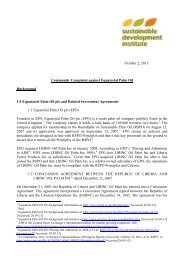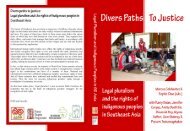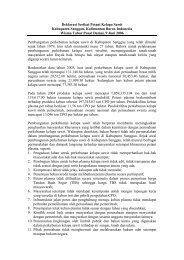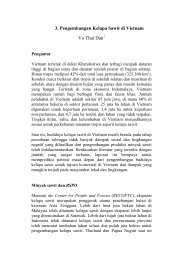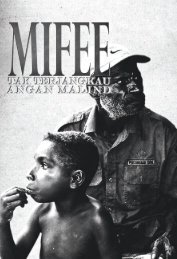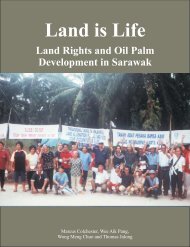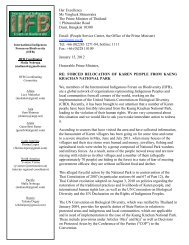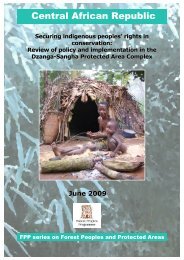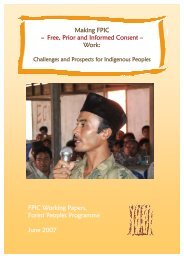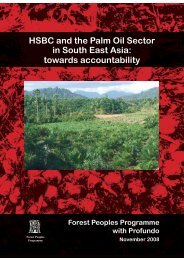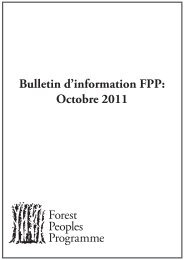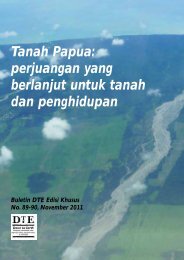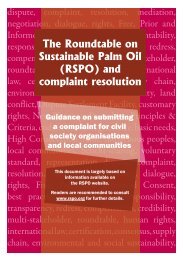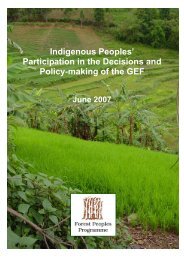The Upper Caura, Venezuela - Forest Peoples Programme
The Upper Caura, Venezuela - Forest Peoples Programme
The Upper Caura, Venezuela - Forest Peoples Programme
You also want an ePaper? Increase the reach of your titles
YUMPU automatically turns print PDFs into web optimized ePapers that Google loves.
Protecting and encouraging customary use of biological resources: <strong>The</strong> <strong>Upper</strong> <strong>Caura</strong>, <strong>Venezuela</strong>_________________________________________________________________________________________As regards land, Article 2 of the Agrarian Reform Law of 1960 explicitly:Guarantees and acknowledges to the indigenous population that bit may actuallykeep its communal or extended family condition, without diminishing the rightswhich belong to them as <strong>Venezuela</strong>ns, in accordance with the above sections, theright to have the benefit of the lands, woods and waters that they occupy or whichbelong to them in those places where they habitually dwell, without prejudice totheir incorporation into the national life as conforms with this and other laws.In accordance with this policy of progressive integration, in December 1990, <strong>Venezuela</strong>formally recognised ILO Convention 107, Article 11 of which explicitly recognisedindigenous peoples’ collective rights of ownership of the lands they have traditionallyoccupied. 30 In the <strong>Caura</strong>, however, these legal provisions related to lands were never appliedand the indigenous peoples remained without legal protection of their land rights.However, other elements of the Agrarian Reform law were taken advantage of by theYe’kwana who in the early 1980s established an Empresa Indigena (indigenouscooperative) at Sta. Maria de Erebato, which obtained legal personality in line with theprovisions of the Agrarian Reform Law. <strong>The</strong> cooperative, which received support from themission, the State government and from the National Agrarian Institute, embarked on avigorous programme of community development focused on the production for sale inMaripa and Ciudad Bolivar of coffee, cacao and cattle. 31New Legal FrameworkIn March 2000, the renamed Bolivarian Republic of <strong>Venezuela</strong> adopted a new Constitutionwhichrecognises the existence of indigenous peoples and communities and theirsocial, political and economic organization, their cultures, manners andcustoms, languages and religions, as well as their habitat and aboriginalrights over the lands which they have ancestrally and traditionally occupiedand which are necessary to develop and guarantee their ways of life. <strong>The</strong>National Executive has the corresponding duty, with the participation of theindigenous peoples concerned, to demarcate and secure their collectiveownership rights to their lands, which will be inalienable, unmortgageable,not subject to distraint and untransferable…’ (Article 119). 32<strong>The</strong> Constitution likewise recognises the right of the indigenous peoples to maintain anddevelop their identities, cultures, cosmovisions, values, spirituality, sacred sites andlanguages (Article 121) and to maintain and promote their own economic practices based onreciprocity, solidarity and exchange and their traditional productive activities (Article 123).In May 2001, <strong>Venezuela</strong> formally passed a law in the National Assembly adopting theInternational Labour Organization’ Convention # 169 on Tribal and Indigenous <strong>Peoples</strong>. 33Among the most important obligations this law places on the State are the following:30 Marcus Colchester, 1995, <strong>Venezuela</strong>: Violations of Indigenous Rights. World Rainforest Movement,Chadlington.31 Marcus Colchester, 1982, Amerindian Development: the search for a viable means of surplus production inAmazonia. Survival International Review 41/42:5-16.32 Constitución de la Republica Bolivariana de <strong>Venezuela</strong>, 24 de marzo de 2000.33 Ley Aprobatoria del Convenio 169 de la OIT Published in the Gaceta Oficial No. 37.305, on 17 October2001. <strong>The</strong> ILO was officially informed of this ratification in May 2002.33



